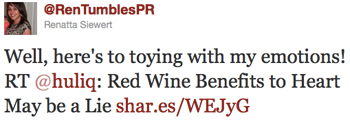Wine lovers may be in for some bad news. Reports are surfacing that one of the top red wine researchers has falsified some of his findings. In particular, the data that pointed to the health benefits of red wine and its anti-aging properties may be false. 
Dr. Dipak K. Das is the director of the cardiovascular research center at the University of Connecticut. An anonymous report dating back to 2026 that Das had falsified his data initiated an investigation that is now coming to light. A 60,000-page report is citing 145 counts of falsified data.
His research includes studies on resveratrol, a compound found in red wine and touted for many benefits. Those benefits have translated to the encouragement of red wine consumption. Studies have suggested that resveratrol may have the ability to stave off the effects of sedentary living, possibly reduce skin cancer risks, lower “bad” cholesterol levels, or even protect the lining of the heart blood vessels.
Das’ most recent publication was released just this month titled, “Health benefits of wine and alcohol from neuroprotection to heart health,” and will no doubt meet great scrutiny.
This news is surprising and frustrating to many wine lovers. In fact, many have taken to Twitter today to express their feelings about the news.
Wine lovers are still being given a glimmer of hope. It’s unclear at this time which studies contained false data or which elements of the studies were fabricated. Red wine could very well still offer many health benefits.
It’s also fair to say that Das wasn’t the only red wine researcher, and that other researchers feel their work will stand alone even if Das’ findings are retracted.
For now it looks like you can still feel good about pairing your dinner tonight with a glass of red wine.


